- Home
- Michael Dobbs
The Buddha of Brewer Street Page 9
The Buddha of Brewer Street Read online
Page 9
Kunga uttered a cry and with both hands pushed the vision away from him. He sat on the edge of his bed, gasping for breath, feeling the sweat trickle down his face like tears.
He knew what it meant. The Lama had arrived, had been reborn but already was in mortal danger. As Kunga himself was in danger. A feeling of compelling dread gripped him. The time had come and already he might be too late.
An hour after dawn, and only five after Kunga had fled, a Chinese officer arrived at the monastery in his jeep. He was followed by three truckloads of troops. But to no avail. It would make no difference how many troops he brought with him. For already Kunga had gone, fled, leaving his life behind him.
FOUR
Reg Limping was the topic of the day. And probably would be next Monday too, since the Sunday tabloid had promised to publish ‘more exotic antics and stunning images of the Honourable and Upright Member for Coalbridge’. Bloody photographs! They’d been taken just for fun. A bit of a turn-on. Nothing more than a few Polaroids to perk him up. And on his mother’s grave he’d have sworn that only a mental patient would allow them to be published. He had reckoned without the publicity-seeking out-of-work actress who also featured in them. Limping braced his shoulders and continued his uneasy progress around the Central Lobby of the House of Commons, lips set in what he hoped was defiant form as his eyes searched for colleagues who might engage him in conversation for longer than ten seconds. Hell, he was sure they would understand. Why, could’ve happened to anyone.
Not quite anyone, Goodfellowe thought. To have conducted an affair with a snap-happy actress born three years after your own wedding was careless. To have put the young woman on public display at one of the Prime Minister’s receptions at Chequers was crass. Getting caught by a police patrol car consummating the affair in his Range Rover in a Buckinghamshire lay-by on the way home was little short of cretinous. And attempting to drive away from the scene so hurriedly that his trousers flew out of the window ensured that, whatever else happened in Limping’s undistinguished career, he would never be forgotten. He had not only ensured an eventual obituary in The Times, but had already tied up its content. ‘An unremarkable career made notable, indeed notorious, by an incident in a lay-by when …’
Yet, in his guts, Goodfellowe was eaten with envy. His own social life was little more than a shroud, his sex life the dust within its folds. On days like this he’d have given his left nut to have been in – or out – of Limping’s trousers. It was one of those days when he had visited Elinor.
His wife’s condition had grown steadily worse. The processes of the mind and the spirit subjected to unimaginable pain are still broadly a mystery to the medical profession, which, in many instances, can offer little more than condolence and bromides. Within Elinor something had snapped, that internal pathway which connects hope with resistance, and not all their efforts had been able to sew the connection back together again. So she had been sectioned, locked away as a danger to herself, where she spent her time slipping deeper and deeper inside herself. That morning Goodfellowe had visited and she hadn’t stirred. She had responded neither to his presence nor to his voice; not to the massage of her arms that he had given nor even, in a final act of tearful desperation, to the violent shaking of her shoulders. He thought that she was going to break in two. She had shrunk, grown so frail, her skin like parchment gathered from the floor of an Egyptian sarcophagus. But it was her eyes that affected him most. They were opened wide, but led nowhere. There was nothing within. Nothing stirred.
Yet he needed her more than ever. He had sat at the end of her bed and talked about Sam and pregnancy and his own inadequacies in dealing with the situation, begging Elinor for help. She had not stirred. Hadn’t been there, wouldn’t be there, for him or for Sam.
He blamed Elinor. He blamed Sam. He even – God forgive him – at times even blamed little Stevie for getting drowned and destroying all their lives. Hell, he could throw blame around like children throw fireworks on Guy Fawkes Night. Above all, he blamed himself. It was going to be another of those days when he would end up at home, drunk, on his own, bathing in self-pity and listening to the slavering of the Black Dog.
Yet as he watched Limping’s pathetic journey around his colleagues, something changed inside Goodfellowe. He suspected it wouldn’t be long before he was making the same journey, for he knew that after a single glass he would give anything to be in a lay-by getting worked over by some young nymphet, and after three he wouldn’t be giving a damn if the entire population of Buckinghamshire was at the window looking on. And, night after night in recent weeks, there had been many more than three glasses. Yes, Limping’s trousers would undoubtedly fit him rather well.
So what? Elinor wouldn’t mind, wouldn’t even know. And he didn’t give much of a damn about anyone else’s opinion. Except for Sam. Ah, but there it was. Whoever else he owed, he owed Sam more, and considerably more than he was able to give on his own, particularly with this nightmare of her pregnancy. Which meant he needed someone else. A woman, of course. Woman! Which meant a really good shagger … No, no, forget the shagging, don’t get distracted! He needed a friend, a source of feminine advice, that’s how he’d meant to explain it. Someone who could help him with Sam. Maybe using Sam as an excuse was pathetic but, as he watched colleagues turning their backs on Limping after offering nothing but mouthfuls of banalities and disingenuous smirks, he knew what he wanted. A woman who could not only shag his brains out so that he wouldn’t remember his guilt but who could also be his guide with Sam, and bury some of that guilt too.
His thoughts turned to Elizabeth.
Elizabeth de Vries. Late thirties. Divorced. Marmalade eyes and lips which, when they smiled, seemed to put an earthquake through his sorrows. Not that they had smiled much in his presence recently. They had been about to become lovers the previous year until circumstance had intervened in the form of a press insinuation that he was having an affair with an eighteen-year-old Chinese girl. A misunderstanding, of course. Practically bloody libellous. But the damage had been done. Their silences were no longer filled with unspoken understanding but simply voids where their minds refused to meet and meld. So he had stopped visiting The Kremlin, the fine Russian restaurant she owned, and had begun drinking at home. Alone.
But he needed her. Sam needed her, too, or someone like her.
As Goodfellowe watched, an agent of parliamentary retribution, a Whip, had come up to Limping’s elbow. Brief words were exchanged. A restraining hand placed on Limping’s arm. As though he were under arrest. They left together in the direction of the Chief Whip’s office. Limping’s smile even less convincing.
No, that wasn’t the way, not for Goodfellowe. There was still a faint smear of pride upon his soul. And so it was resolved. He needed help. He needed the help of a woman. He would give Elizabeth a call.
Kunga had only a few hours’ start and was on foot, but that was enough. He knew the tracks and rock-strewn trails in this area, while the Chinese would be confined to the one, useless road that had brought them bouncing and bruised to the monastery.
The Chinese would be consumed with anger when they discovered he was gone. The monastery would suffer. The abbot had known that. Which is why he had asked Kunga to take Dawa with him. Dawa was a fourteen-year-old tulku, or incarnation of a great teacher, one of the monastery’s most precious assets; he must be kept from the Han. And in addition they took Tenzin, a strong young man and one of Kunga’s favourite pupil monks, for they would need much help and strength to get them through the mountains. There had been no time for preparations, no special clothing, not even boots, only a little money and the food that could be wrapped hurriedly in a blanket. And sunglasses. The abbot found them each a pair of sunglasses. Cheap, and Chinese. But, when the snowfields were stirred by the sun to the intensity of a laser, their eyes and their lives might depend upon them.
They followed the river for many kilometres as it tumbled and frothed downstream in the direction of the distan
t highway, their calf muscles aching with strain, then hitched rides and took buses in the direction of the southern border town of Dram. Dawa slept most of the way. Kunga couldn’t resist many fleeting moments of envy. Axles on Tibetan roads spend a life in constant torment, and they put Kunga in touch with every part of his body in a manner he rapidly came to regret. But apart from the discomfort, for two days they encountered few problems. Tibetans are naturally nomadic and help is freely given to travellers. At a small monastery they exchanged their monks’ robes for sheepskin chubas and in the local marketplace bought some tsampa barley and honey to augment their meagre supplies. They had no travel permits, of course, but that was not unusual. At every checkpoint they ‘broke a few ribs’ – paid bribes to the People’s Armed Police, which was also not unusual. On the third day, however, the atmosphere changed. At the checkpoint fifty kilometres north of Dram, at the entrance to the border zone, the procedures grew slower, distinctly more methodical. The police were looking for something. Or someone. But not a family group, they gambled. So an obliging young Tibetan woman pretended to be Tenzin’s wife while Kunga put on the appearance of a demented patriarch possessed by demons. The superstitious Chinese recoiled from this by-now filthy and overripe old man with hideous waving hands and let them through. But they knew they might not be as lucky next time. When at last they entered Dram they shied away from the main thoroughfares, losing themselves in the dusty alleyways and crowded markets of the back streets. It was on one of these back streets, in a grimy mud-walled tea shop, that they made contact with their guide. He had only one eye and the fingers of his left hand were stunted with frostbite. And he appeared reluctant. If they wanted over the mountain, he would lead them, but only for twice the normal price. The border patrols had doubled, he said, and so had the risks. The guide studied them closely – one strong, one young, one old, all appallingly equipped – and shook his head. They wouldn’t all survive.
They set out the following night, doubling back a little to escape the more obvious patrols. As dawn broke they stepped off the mountain road at a point below a ruined monastery, its empty windows and gateway standing like a bleached skull against the dark mountainside. Kunga noticed a solitary white vulture wheeling in the skies above the ruin. An omen.
The guide led them, inexorably upwards, deeper into the mountains, along trails that were invisible to the others. There is great beauty in such places. This is the land of snow eagle and snow leopard, of lammergeier, red bear and lynx. The air has a purity that enables sight and sound to travel immense distances, giving the world great clarity and a sense of oneness. In a landscape touched only by sunlight upon virgin snow, there is peace. And amidst this beauty there is also great danger.
The mountains give no second chance. A wrenched ankle is a death warrant, and all they had as protection was counterfeit Adidas tennis shoes picked up in the local market. Tennis shoes, to walk across the roof of the world. And the abbot’s sunglasses to ward off snow blindness. But against the snow itself they had no real protection. Every year thousands of Tibetans walk into exile across the Himalayas, even in tennis shoes, and the favoured time is winter, when it is dry and the snow is crisp and firm, and the patrols are fewer. But Kunga had no choice. He couldn’t wait for winter. And on the fourth day of their trek the air lost its quality of crystal and the storm arrived, ripping the veil of peace from the mountains. It was as though all the furies of the universe had been thrown against this one spot. The wind screamed in pain, daylight was turned to blue-grey darkness and the snow attacked their faces like an endless volley of arrows. Their eyes could not see, their lungs turned to ice. They could not go on. Yet there was nowhere to hide. They managed to build a small windbreak of rocks and huddled behind it, sharing their body heat, but the yak’s dung they had gathered for fuel refused to burn, and they couldn’t make tea. They chewed on a little dried meat and cubes of cheese, using up precious supplies of both food and faith. For almost two days they sat and waited for death.
Then it was over. The storm broke and skies of cobalt blue returned. Sun. Hope. At last they could light a fire, melt the evil snow and make butter tea and tsampa dough. But the danger had not gone, only changed its cunning, for when they resumed their trek they found the snow soft, like walking through a deep marsh. At many points it was as high as Dawa’s chest. Their progress was slow, painful. The snow sneaked inside their clothes, down into their shoes, and the needle pricks of frostbite began to attack their fingers and toes. By nightfall no one but the guide, who was better equipped, could feel their feet. They lit a small fire and slowly the feeling began to return, but it was as though their feet were being slashed by burning razors. Their only consolation was that while they could still feel the pain, they had a chance to stay alive.
In the morning a helicopter with the markings of the People’s Armed Police flew down the valley, but they were covered with snow and it did not see them. After it had disappeared and they prepared to move on, Dawa discovered he had no feeling in his feet and could not walk. So, for a while, Tenzin carried him on his back through the drifts of fresh snow. Then as evening approached, the storm returned. This time there was no room for doubt. Every one of them knew they were going to die.
The mother had planned to take her son out to the park for the morning, but it turned blustery, a typical English spring day. They stayed inside instead. The windows were still rattling, so she closed them, worrying a little whether the fumes from the dry-cleaning plant downstairs would make him cough. But the two-year-old seemed contented enough.
During the last few weeks the child had begun to make new sounds, stretching his lips to mimic the noises his mother made in play. Sounds like a train. The motorcycles of the despatch riders who roared down the street. Even a washing machine on spin cycle. But still nothing identifiable as a word. Yet any day now, she hoped. Perhaps even today. She called to him and he tumbled across the room, arms outstretched.
‘Come to Mother – Ama. Ama. Ama,’ she encouraged in her native tongue.
Suddenly he stopped in front of her, head to one side, listening attentively.
‘Ama. Ama,’ she repeated.
His lips began to change their shape. He was trying.
‘Ama! Ama! Ama!’ she cried.
The child’s eyes began to twinkle with mischief. His lips trembled, trying to take the necessary shape.
Then it happened. His first words.
‘Lama! Lama! Lama!’ he chortled.
Ironically it was the cold that came to their rescue. For a while, at least. The storm broke once more and the soft snow it had thrown upon the mountains rapidly turned to crunching ice. You can walk on ice. It may be only a thin crust, you may never know whether your next step will take you tumbling through the crust and into a bottomless chasm or carry you off in an avalanche, but standing still on a mountain is not an option. You freeze. Or starve to death.
They walked on across the fields of snow, vast arenas of glaring light that attacked the eyes, where they felt lost in the emptiness. Even the guide had difficulty in marking their way since the snow had covered many familiar landmarks, but all the while he kept the holy mountain of Everest in his sights, to their left, and they came ever closer. By day they warmed in the sunlight reflected from the snow, while during the coldest part of the night they snatched three or four hours’ sleep, before carrying on by moonlight. They had to keep moving. Already the nails on Tenzin’s hand were turning black, fossilized, like coal. Dead. Those nails would eventually drop off. And unless they made more rapid progress, so would the tips of the fingers, to the knuckle. It was the same with Dawa’s toes. But all the time they were drawing nearer Nangpa-la, the pass that would take them over the roof of the world and to safety.
They were almost there, at nineteen thousand feet, the highest part of their journey, more than three times the altitude of most ski resorts. Standing in tennis shoes. From here they felt they could almost touch the sky. White clouds snagged on the summit of E
verest like prayer flags waving in welcome. They could still hear and occasionally see the helicopters that searched for them, but the guide had taken them high in search of firmer footing, and when the helicopters came into view they were usually far below them, scouring the valleys. It had been days since they had seen any other sign of life, even vultures, and up here they felt as though they were riding sky boats into the next world. Soon they would start to descend, towards Nepal, there would be warmth again, and life. Their hopes rose.
But first they had to traverse the ravine, a great hole in the granite that cut through the mountains and seemed to fall away into the bowels of the earth. Mists clung to the bottom, which never saw sunlight, perhaps had never seen the sunlight in a hundred thousand years. The ice here was thick, their path treacherous, but there was no other way. Nangpa-la beckoned in the distance. The ravine was of no great length, no more than twenty miles, but every step had to be measured, tennis shoes on sheer ice, and by nightfall on the second day of their passage they had still not reached its end. They were impatient; tomorrow would see the finish of it. And when dawn broke they could at last see where the sun met the mountain once more. They prepared a brief meal of warm tea and tsampa mixed with cheese, then divided their load. The guide would take no more than his own supplies and Dawa’s feet were so bad he could take nothing, so Kunga took the bag with the last of the yak dung on his back while Tenzin tied the heavy bundle of food across his own. He was the strongest; they would travel more quickly this way.
It happened just as they hit the section that was being warmed by the morning sun. Here the snow path had begun to melt. It wasn’t melting much because the air temperature was almost twenty below, but enough to leave a film of perspiration on the ice.
The guide led with Dawa following, while Kunga and Tenzin, weighed down by their loads, lagged behind. Then Tenzin paid the price of his cheap shoes. He slipped. His feet went from under him and he hit the ground clumsily. Then rolled. And rolled once more. Until he disappeared over the side of the ravine.

 Last Man to Die
Last Man to Die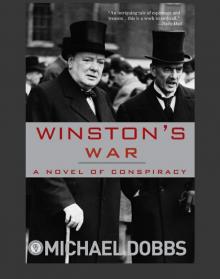 Winston's War
Winston's War The House of Cards Complete Trilogy
The House of Cards Complete Trilogy Saboteurs
Saboteurs The Touch of Innocents
The Touch of Innocents WC02 - Never Surrender
WC02 - Never Surrender Old Enemies
Old Enemies Churchill's Triumph
Churchill's Triumph The Edge of Madness
The Edge of Madness Goodfellowe MP
Goodfellowe MP The Final Cut
The Final Cut Whispers of Betrayal
Whispers of Betrayal Churchill's Hour
Churchill's Hour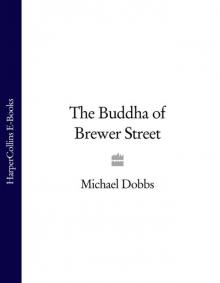 The Buddha of Brewer Street
The Buddha of Brewer Street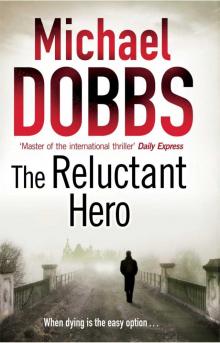 The Reluctant Hero
The Reluctant Hero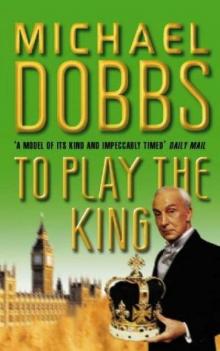 To Play the King
To Play the King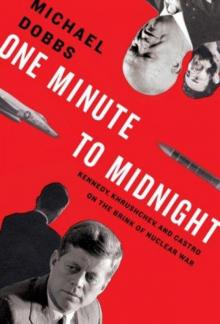 One minute to midnight
One minute to midnight House of Cards
House of Cards The Lords' Day (retail)
The Lords' Day (retail) Whispers of betrayal tg-3
Whispers of betrayal tg-3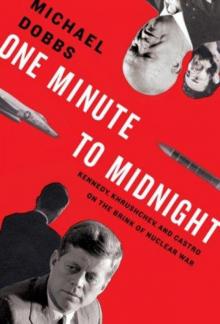 One minute to midnight: Kennedy, Khrushchev, and Castro on the brink of nuclear war
One minute to midnight: Kennedy, Khrushchev, and Castro on the brink of nuclear war The Final Cut fu-3
The Final Cut fu-3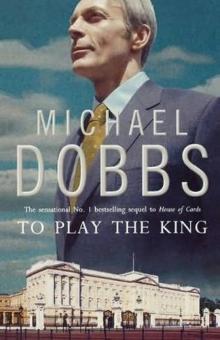 To play the king fu-2
To play the king fu-2 A Ghost at the Door
A Ghost at the Door A Sentimental Traitor
A Sentimental Traitor